Early Research Into Yaquis Native Americans Had Support From West Texas Region Amidst Great Depression
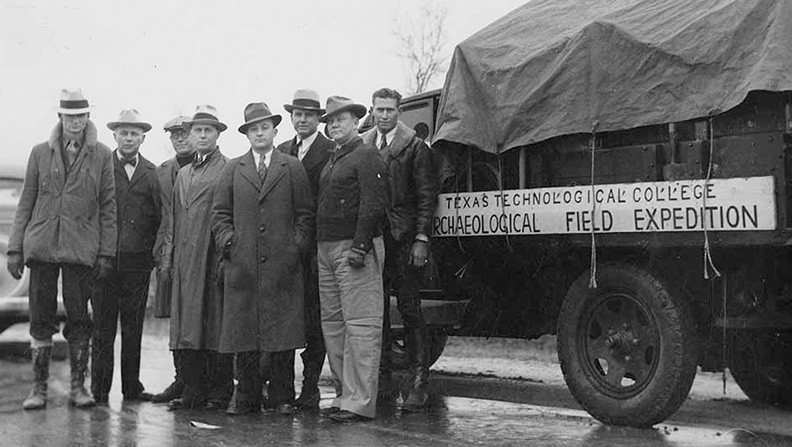
In the worst years of the Great Depression, researchers from Texas Technological College joined forces with local newspapers, businesses, and the West Texas Chamber of Commerce to go on the first two of several expeditions to Mexico to meet with the Yaqui tribe, a group of people known as “the only unconquered Indians in America.”
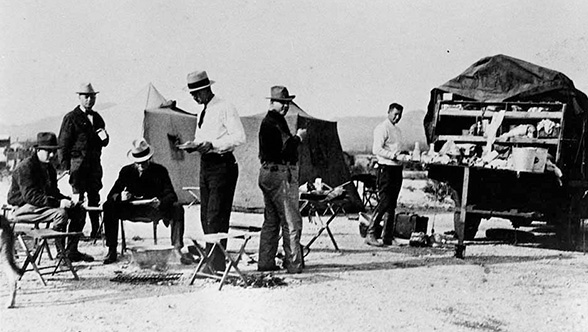
In return, they gained the trust of many of the remaining tribes and brought their stories, photos, and examples of some of their everyday tools and items to share in the United States and beyond.
Texas Tech University has a goal of involving students – including undergraduates – in research, as well as pursuing research goals that meet the needs of the West Texas region.
Some of Texas Tech's earliest research efforts met those goals. In spite of the Great Depression, which began within the first 10 years of the creation of Texas Technological College, field trips were organized for students by faculty. According to “The First Thirty Years: A History of Texas Technological College 1925-1955,” by Ruth Horn Andrews, “Perhaps the most spectacular of the field trips sponsored by the College was that inaugurated by Doctor (William Curry) Holden.”
Andrews was the daughter of Texas Tech's first president, Paul Whitfield Horn. She described a series of field trips starting in 1934 and led by Holden, professor of history and anthropology and director of archaeological research at Texas Tech. Holden became interested in the Yaqui Indians of Sonora, Mexico, and he wanted to lead an expedition to Sonora to study the people. Texas Tech President Bradford Knapp and the college's board of directors apparently expressed their approval in 1933, but could not provide financial aid.
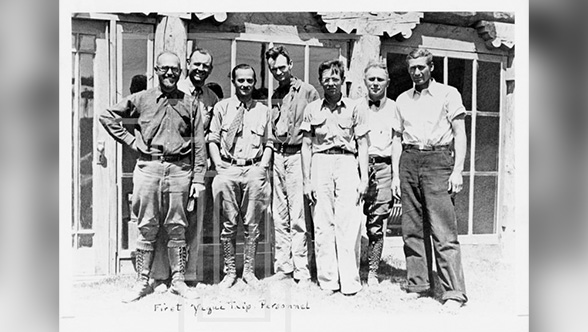
The local newspaper, the Lubbock Avalanche-Journal, decided to sponsor a campaign to raise funds locally. Local service clubs, businesses, and the West Texas Chamber of Commerce all chipped in, and by March of 1934, the expedition started out with several Texas Tech faculty members, an anthropologist from Harvard University, a doctor from the West Texas Hospital in Lubbock, the editor of the A-J, Lubbock businessmen, and a Texas Tech student, Bennie McWilliams.
The medical doctor, Charles Wagner, operated or treated several Yaqui members during the trip to Sonora, which according to Andrews, seemed to have instilled confidence in the tribal members. But the expedition members found their interpreters were not as effective as they might have liked, so Texas Tech sent a second expedition in the fall of 1934. The initial expeditions apparently piqued the interest of West Texans, who supported similar expeditions, and inspired the respect of the Yaqui people. The A-J wrote many articles about the expeditions to the Yaqui villages in Mexico.
“The Indians now welcome the Texans as old friends and trust them with a confidence and consideration perhaps never accorded any other white men,” Andrews wrote in her book celebrating Texas Tech's first 30 years.
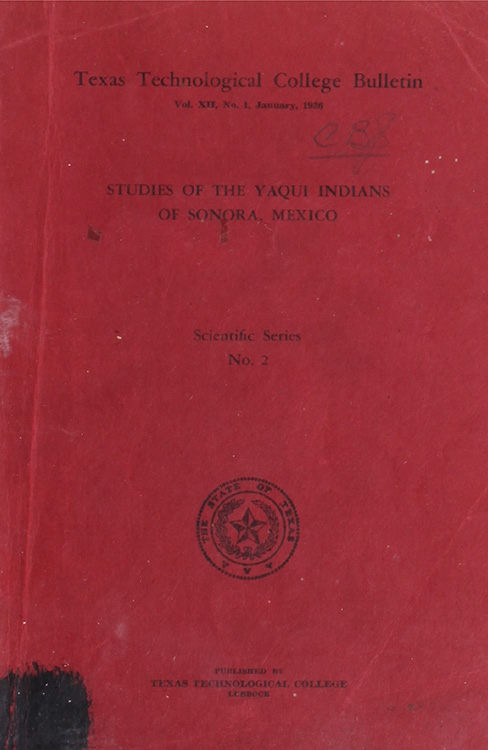
A 142-page account of the expeditions, “Studies of the Yaqui Indians of Sonora, Mexico,” was issued as the Texas Tech Scientific Series No. 2, Vol. XII in 1936. As of the publication of Andrews' book, the bulletin was the all-time best-seller at the College Bookstore, and orders were received from every state and even from as far away as Stockholm, Sweden.
The first expeditions secured 144 museum specimens, with 71 going to Harvard University and 73 going to the Plains Museum Society at Texas Tech. In addition, those on the expedition brought back approximately 600 pictures and 1,200 feet of movie film.
“The two collections are for the most part duplicates and represent fairly well the articles used by the modern Yaqui,” Holden states in the Texas Tech bulletin.
The Texas Tech bulletin has information on the Catholic faith of the Yaqui, weddings, funerals, architecture, economy, agriculture, and medical practices. Because the very first expedition was in spring of 1934, those on the expedition witnessed the Yaqui Easter Fiesta, and color film of the event was shown to Texas Tech museum members in May. The Easter celebration was also detailed in the bulletin.
Coincidentally, some of the descendants of the warriors of the Yaqui Indians ended up in Lubbock. According to their history on their website, tbyi.gov , their ancestors came into Texas under the leadership of Lino Domingues Urquides, known as the Ya'ut, or leader, of the tribe.
Izzy Ramirez is the chairman of the Texas Band of Yaqui Indians, which is located in Lubbock. Most of the Yaqui, he said, originated in Sonora, but the Yaqui people came in and out of the current-day areas of Texas, Arizona, and New Mexico, as well as the Mexican State of Chihuahua. As the chaos of invaders on their lands happened, Ramirez said people gradually scattered throughout those areas and beyond. Many were forcibly deported by the Mexican government as slaves to Yucatan, as well.
Although a tribe of Yaqui was federally recognized in Arizona in 1978, many of the Yaqui who did not settle in Arizona were not included, Ramirez said. But since that group originated in a different village of the Yaqui lands, the Texas Yaqui and those who went even further than Texas were never given recognition as tribal members.
“Our nation was never conquered by Mexico or the U.S., so there was no real political travel status among Yaqui people, except for a group in Tucson, Ariz.,” Ramirez said. “They're known as the Pascua Yaqui tribe.”
The Yaqui who ended up in Lubbock had no knowledge of the Texas Tech expeditions to Sonora back when they occurred, and it is entirely coincidental that they ended up in the same town where college faculty became so interested in their ancestral home, Ramirez said.
“They went where the work was,” Ramirez said of his own family's location in West Texas. Others ended up all over the United States, with some specifically following the railroads to find new work a thousand miles away in Michigan.
When his ancestors left Mexico with Chief Lino, they changed their names in order to avoid genocide in Mexico, according to the Texas Yaqui webpage.
“The Yaqui Indians were never conquered, and most of them scattered throughout the southwest unidentified and uncounted.”
“The family descendants of Chief Lino were told never to tell anyone that they were Hiaki (Yaqui) and hid their Indian identities with the families until recent decades,” the Texas Yaqui page states. “The Yaqui Indians were never conquered, and most of them scattered throughout the southwest unidentified and uncounted. Most who left reference their homelands as their source of ancestry and to begin a new life away from the cultural genocides of Mexico.”
Ramirez said his own direct ancestors, including Chief Lino, were ruthless fighters and protectors in the mountains surrounding the Yaqui homelands.
The Texas Tech bulletin speaks about some of those mountain warriors who stayed in Mexico and were still there when they went on the expeditions.
“Ten men in the mountains can defend the passes against hundreds below by rolling rocks down on them. The Yaquis have from time immemorial held these mountains and are still holding them today. They will never be completely conquered so long as they continue to occupy them,” the Texas Tech bulletin states.
In a section of the Texas Tech bulletin about Yaqui agriculture, Richard Arthur Studhalter states that in general agriculture and war are antonyms. Societies at war could not generally produce crops, Studhalter wrote.
“What more war-loving race has there been on the American continent than the Yaqui Indians? For a period of about four centuries, they have been on an almost constant war path with the Spaniards and the Mexicans, and they are still spoken of as the only unconquered Indians in America,” Studhalter states. “For about four hundred years, they have been driven, more or less periodically, from their eight villages, abandoning homes and fields in pursuit either of the enemy or safety in the adjacent Bacatete Mountains.”
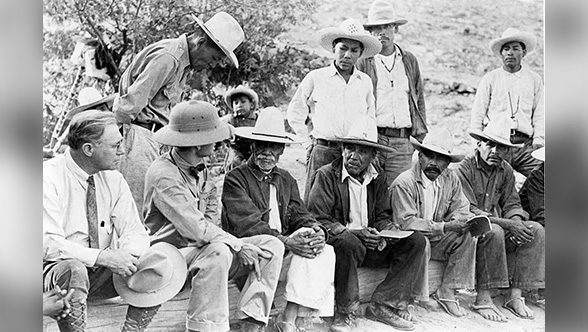
But Studhalter, a professor of biology at Texas Tech, states agriculture was still the heart of the civilization of the Yaqui people. Missionaries in the 17th century noted that Yaquis were an agricultural tribe, he wrote. In the 1930s, Texas Tech researchers observed Yaquis growing corn, beans, watermelons, tobacco, sugar cane, sweet potatoes, wheat and much more. Additionally, bamboo-like carrizo plants used for ornamentation in the U.S. at the time grew wild and had to be cleared for crops. Studhalter states the Yaqui people used methods of harvesting wheat that were similar to techniques used in biblical times.
Ramirez said at the time of the Texas Tech expeditions, his family and others were still basically in hiding. They found out about the expeditions in more recent years, and Ramirez said he read the Texas Tech bulletin about the first expeditions.
“It would be nice to see or to know about more of the expedition. To see the town and see some of the photos, some of the things that they took and brought back, that would have been, I think, more of value now,” Ramirez said in March of 2022.
The Texas Band of Yaqui Indians has been working for years to identify descendants who were not included in the Arizona tribe in the 1970s, to find historical documentation regarding the Yaqui tribe, and to gain federal recognition as a tribe. In 2015, the Texas Band of Yaqui Indians were recognized by the State of Texas under Senate Resolution 989 championed by State Sen. Charles Perry, R-Lubbock. Gaining federal recognition is still a goal for the tribe members.
